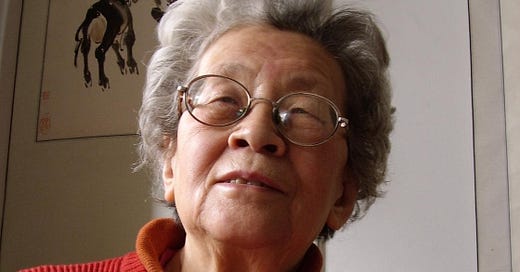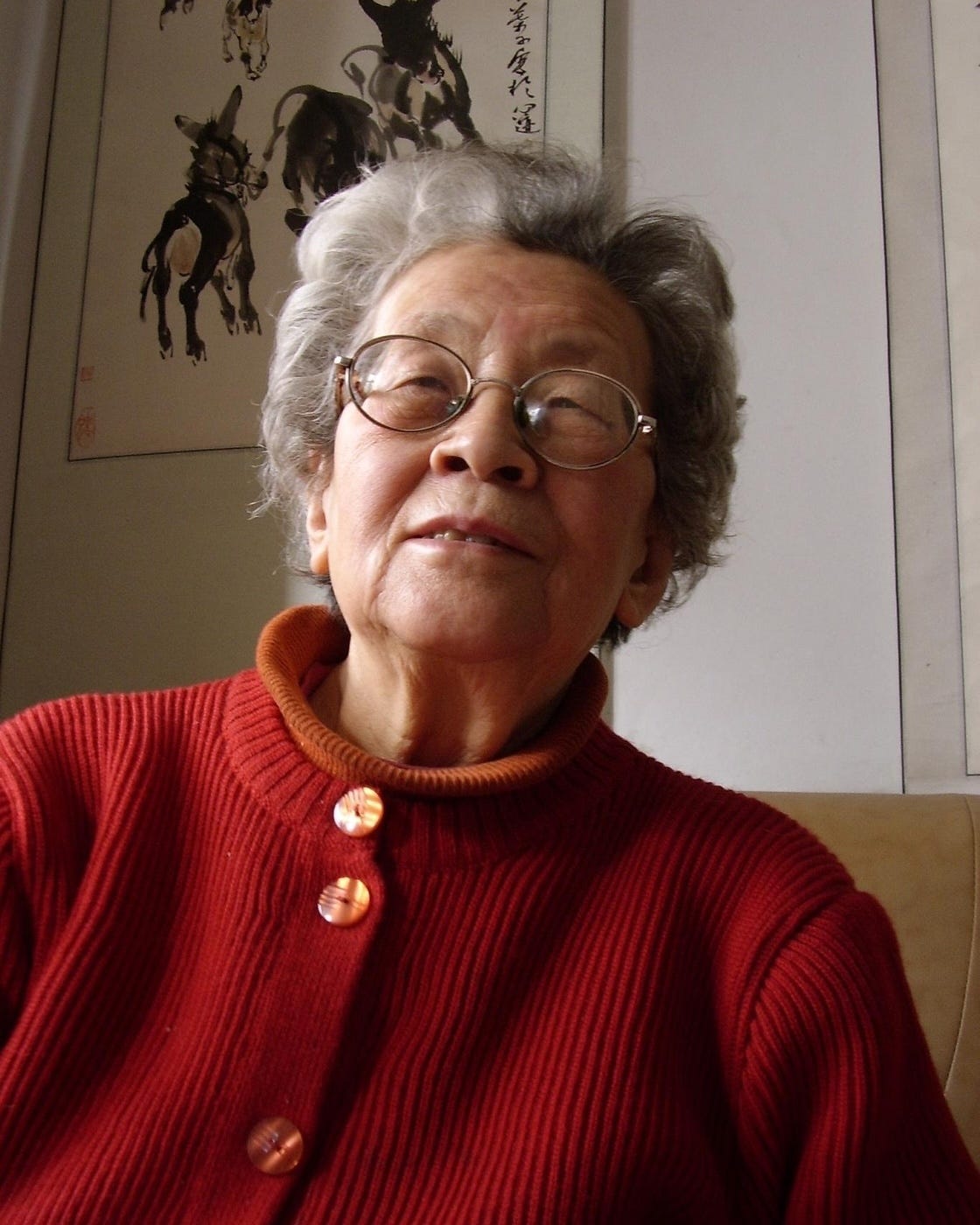夹边沟亲历者和凤鸣辞世:一位捍卫记忆的女战士
A Woman Warrior Who Defended Memory: Eyewitness of Jiabiangou, He Fengming, Passes Away
作者:马奇诺
By Ma Qinuo
The English translation follows below.
中国1957年“反右运动”的受难者和凤鸣女士,于2025年6月4日晚上驾鹤西去,终年93岁。作为长期关注这一段历史的后辈,我听闻消息,心情久久难以平静。灯下重读她的著作《经历:我的1957年》,不忍释卷。
和凤鸣25岁时,夫妻双双被打为右派,此后长达20年的时间,她彻底沦为政治贱民,九死一生。等到1978年底彻底平反昭雪时,她已经是奔50岁的人了。但是,从1989年退休之后的30年时间,她用超于常人的良心、勇气,在暮年让自己的生命绽放出耀眼的光芒。
历时十年,她完成《经历:我的1957年》一书的写作,并在2001年出版。她还积极协助纪录片导演王兵、艾晓明进行有关夹边沟影像的拍摄。那部长达三个小时的纪录片《和凤鸣》,就是导演王兵三度到访她家完成的佳作。拍摄此片时,她已经75岁高龄,连续面对镜头数小时,讲述自己痛彻心肺的往事。直面惨痛的记忆是需要勇气的,而她做到了。她的人生,前20年是备受屈辱的政治贱民,后30年则是捍卫记忆的战士。亲人的担忧、当权者的恐吓,都没能阻止她为真相发声。
在一个由意识形态主导着遗忘工程的国家,30年矢志不渝探究真相、捍卫记忆是一件非常不容易的事情。也难怪北京大学的钱理群教授在《和凤鸣与她的<经历:我的1957年>》(再版代序)一文中,称她为“伟大的中国女人”,她当得起这个称呼。
《经历:我的1957年》出过两个版本,第一个版本,2001年由敦煌文艺出版社出版。2006年该书再版时,因为钱理群教授写长文为序,而影响更为广泛。
尽管中国国内有关1957年反右运动的写作与研究一直被视为敏感领域,但是改革开放40年,意识型态领域的管控时松时紧,几十年下来,除了学术研究成果,有关反右运动的叙事类作品数量也有不少。特别是2000年前后,这类题材的作品,曾经有过一个小小的出版高潮。当时甘肃兰州的好几家书店,进门不远处,有一小块地方,就集中摆放那几年陆续出版的与反右有关的图书,比如《夹边沟记事》、《经历:我的1957年》、《恍若隔世——回眸夹边沟》、《寻找家园》等,差不多形成了一个“夹边沟图书专柜”,颇为醒目。除了公开出版发行的作品之外,也有一些非正式出版物以各种形式在民间流传。
那么,在这为数不算少的作品中,尤其和许多反右运动的名人回忆作品相较,和凤鸣这本《经历:我的1957年》的独特价值在哪里?
1957反右运动的受难群体,有着异常复杂的面向。比如章伯钧、罗隆基,他们的确有为中共所不能接受的政治主张;比如储安平、刘宾雁,他们有为中共所不喜欢的思想与作品。但是,和凤鸣则不同,即使在她完成此书的晚年,从她的作品也不难发现,她完全是一个政治上近乎天真的素人。而这样的人,才是反右受难者群体的绝大多数。
读《经历:我的1957年》一书可以发现,如果说和凤鸣的丈夫王景超被打成右派,还是因为写过三篇杂文,有点儿因文罹祸的色彩,她和其他几个同事被打为右派,完全肇始于一些日常工作中累积的琐屑矛盾。和凤鸣供职的《甘肃农民报》,两个副总编之间有罅隙,而和凤鸣等这些普通编辑夹在中间,工作难做,日常难免有些抱怨。而这些完全上不得台面的抱怨,一旦与政治气候相遇,就变成了致命的毒药,成了她被打成右派的理由。据本人所知,当时,本地另一家报社的一位资深校对,完全不“反党、反社会主义”,也不反对单位领导,更准确地说,他还有点谄媚,喜欢在领导面前表现自己。他平时改错别字成了职业习惯,而当年报社领导多是工农干部,开会讲话读文件,经常读错字,这位校对先生开会总坐第一排,做认真纪录状,经常小声提醒领导读错了字,领导极为不悦,而他浑然不晓,结果领导授意别人揭发栽赃,他就成了右派。
所以,《经历:我的1957年》不仅是对极权政治的控诉书,非常时期的社会史,暴露了政治残酷性,它更揭示了日常生活中人性的幽暗。反右运动差不多已经70年之后的今天,如果有青年再读这本书,我觉得把它视为理解认识人性的教科书,可能更有意义。我们热爱人类,但对人性并不能信任,良好的政治制度,是要给人性加把锁,而专制极权的政治制度,恰恰致力于诱发人性之恶。因为人性之恶,是一切专制集权的养料,它让许多人变成魔鬼,也可能让更多人沦为政治贱民。专制极权的统治者都说要把人间变成美丽天国,但他们无一例外把人间变成活地狱。
所以,让我们怀着感激之情来悼念和凤鸣老人,感念她用血与泪写成的文字,为我们留下苦难的见证。
本期推荐档案:
和凤鸣自传:《经历:我的1957年》
和凤鸣自述纪录片:《和凤鸣》
相关档案:
A Woman Warrior Who Defended Memory: Eyewitness of Jiabiangou, He Fengming, Passes Away
By Ma Qinuo
Ms. He Fengming, a survivor of the 1957 Anti-Rightist Campaign in China, passed away on the evening of June 4, 2025, at the age of 93.
As a member of a younger generation who has long followed this chapter of Chinese history, I was deeply shaken by the news. Under lamplight, I reread her book Experience: My 1957, unable to put it down.
At the age of 25, He Fengming and her husband were both labeled Rightists. For the next 20 years, she became a political pariah, enduring persecution and narrowly escaping death time and again. When she was finally and fully rehabilitated at the end of 1978, she was nearly 50 years old. Yet, it was in the three decades following her retirement in 1989 that her life shone with extraordinary brilliance, driven by conscience and extraordinary courage.
Over ten years, she completed her memoir, Experience: My 1957, which was published in 2001. She also actively supported documentary filmmakers Wang Bing and Ai Xiaoming in their efforts to capture the history of Jiabiangou on film. The three-hour documentary Fengming: A Chinese Memoir, directed by Wang Bing, was the result of three visits he made to her home.
At the time of filming, she was already 75 years old, yet she sat for hours in front of the camera recounting the agonizing events of her past, showing tremendous courage to confront such painful memories. The first 20 years of her adult life were spent as a humiliated and persecuted political outcast; the following 30 years were devoted to defending historical memory. The concerns of her family and threats from those in power did not silence her voice for truth.
It's incredibly difficult to persistently seek the truth and safeguard memory for 30 years in a country where ideology dominates the engineering of forgetting. Professor Qian Liqun once called her a “great Chinese woman” in his article and preface to the second edition “He Fengming and Her Experience: My 1957”—a title she wholly deserves.
Experience: My 1957 has had two editions. The first was published in 2001. A second edition appeared in 2006, accompanied by a lengthy preface by Qian Liqun, which significantly broadened the book’s influence.
Although writing and research on the 1957 Anti-Rightist Campaign have always been considered sensitive in China, over the four decades of Reform and Opening, the ideological climate has fluctuated, and despite the restrictions, both scholarly and narrative works on the campaign have steadily emerged. Around the year 2000, there was even a modest publishing boom on the topic. In several bookstores in Lanzhou, Gansu Province, one could find a small, prominent area near the entrance dedicated to Anti-Rightist books published over those years—titles like Chronicles of Jiabiangou, Experience: My 1957, Worlds Away: A Look Back at Jiabiangou, Searching for Home, and others. Together they almost constituted a “Jiabiangou section” on the shelves. In addition to officially published works, many unofficial writings also circulated in various forms among the public.
Among this sizable body of works—particularly when compared to the memoirs of many well-known Anti-Rightist figures—what makes Experience: My 1957 stand out?
The group of victims from the 1957 campaign was extremely complex. Figures such as Zhang Bojun and Luo Longji did hold political views that were unacceptable to the Chinese Communist Party. Others, like Chu Anping and Liu Binyan, had ideas and writings that the Party disliked. But He Fengming was different. Even in her old age, when she completed this book, it is evident from her writing that she was a politically innocent. And it is people like her who made up the vast majority of the Anti-Rightist Campaign’s victims.
Reading Experience: My 1957, one sees that if He Fengming’s husband, Wang Jingchao, was labeled a Rightist because of three essays he had written—persecuted, in a sense, for his words—then He and several of her colleagues were branded Rightists entirely because of minor workplace grievances. At Gansu Peasants’ Daily, where she worked, a rift had developed between two deputy editors-in-chief. He and her fellow editors were caught in the middle, their work became difficult, and they inevitably expressed some complaints. These trivial grievances—nothing that would normally be taken seriously—became fatally toxic when combined with the political climate, and ultimately became the reason she was labeled a Rightist.
According to my knowledge, at another local newspaper, a senior proofreader who did not oppose the Party, did not oppose socialism, and in fact tried to flatter his superiors, was also labeled a Rightist. He had a habit of correcting typos as part of his job. But the paper’s leadership—mostly from working-class backgrounds—often mispronounced words when reading documents aloud in meetings. The proofreader, sitting in the front row and dutifully taking notes, would quietly correct them. The leaders were displeased, though he had no idea. Eventually, they instructed others to denounce him and frame him—thus he too became a Rightist.
Experience: My 1957 is an indictment of totalitarian politics. It is a piece of social history from an extraordinary time. It exposes the cruelty of political persecution, but also reveals the darkness of human nature in everyday life.
Nearly 70 years have passed since the Anti-Rightist Campaign, but for today’s youth, reading this book as a textbook on human nature might be even more meaningful. We may love humanity, but we cannot fully trust human nature. A good political system is one that places restraints on our darker instincts, while a despotic totalitarian regime deliberately cultivates them. For the evil in human nature is the sustenance of all authoritarian rule. It can turn many into monsters and condemn even more to the status of political outcasts. Every authoritarian ruler promises to turn the world into a paradise, but without exception, they make it a living hell.
Let us therefore mourn the passing of He Fengming with gratitude in our hearts, and remember the words she wrote in blood and tears—witness to suffering, left behind for us.
Recommended archives:
He Fengming’s memoir: Experience: My 1957
Documentary on He Fengming’s life: Fengming: A Chinese Memoir
Related archives:






